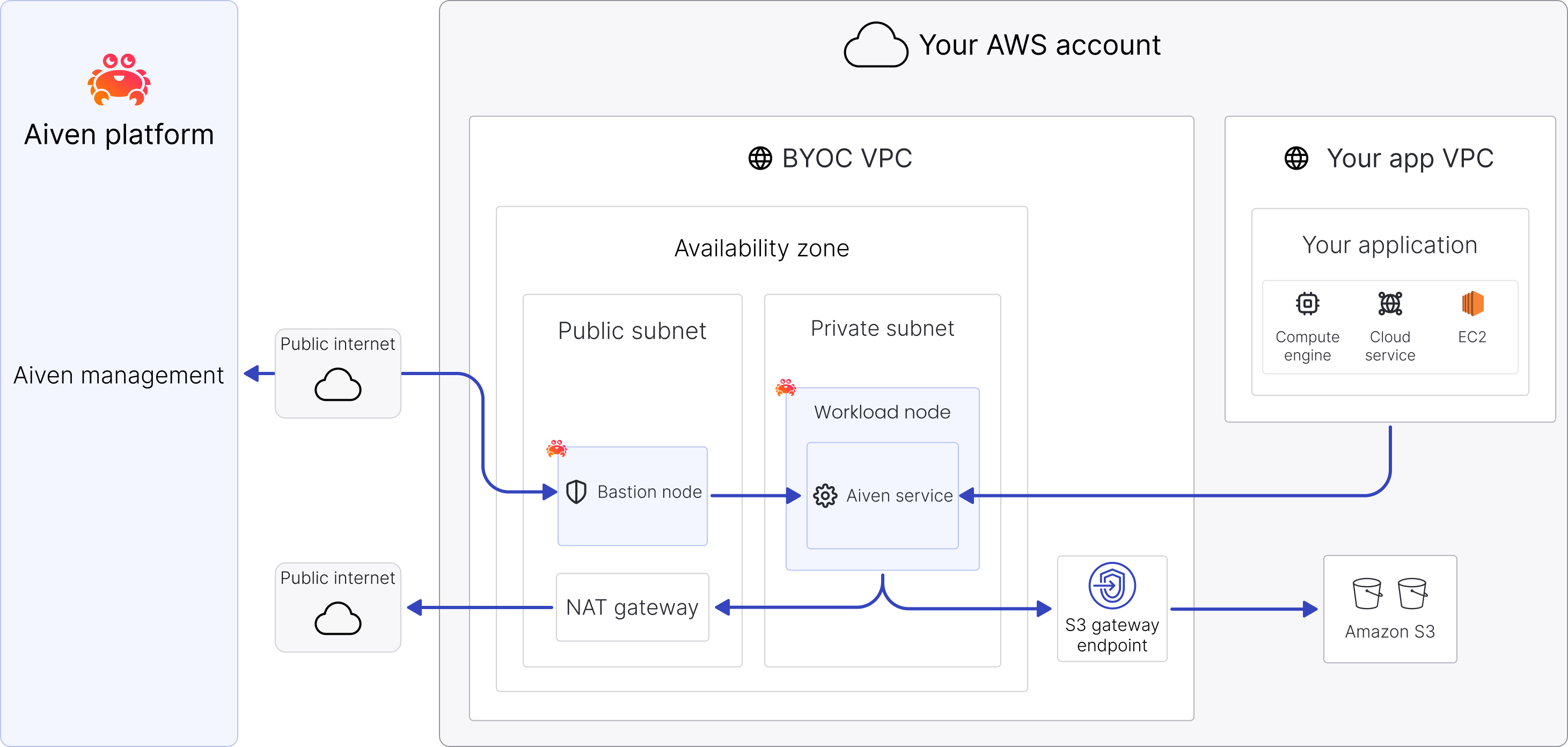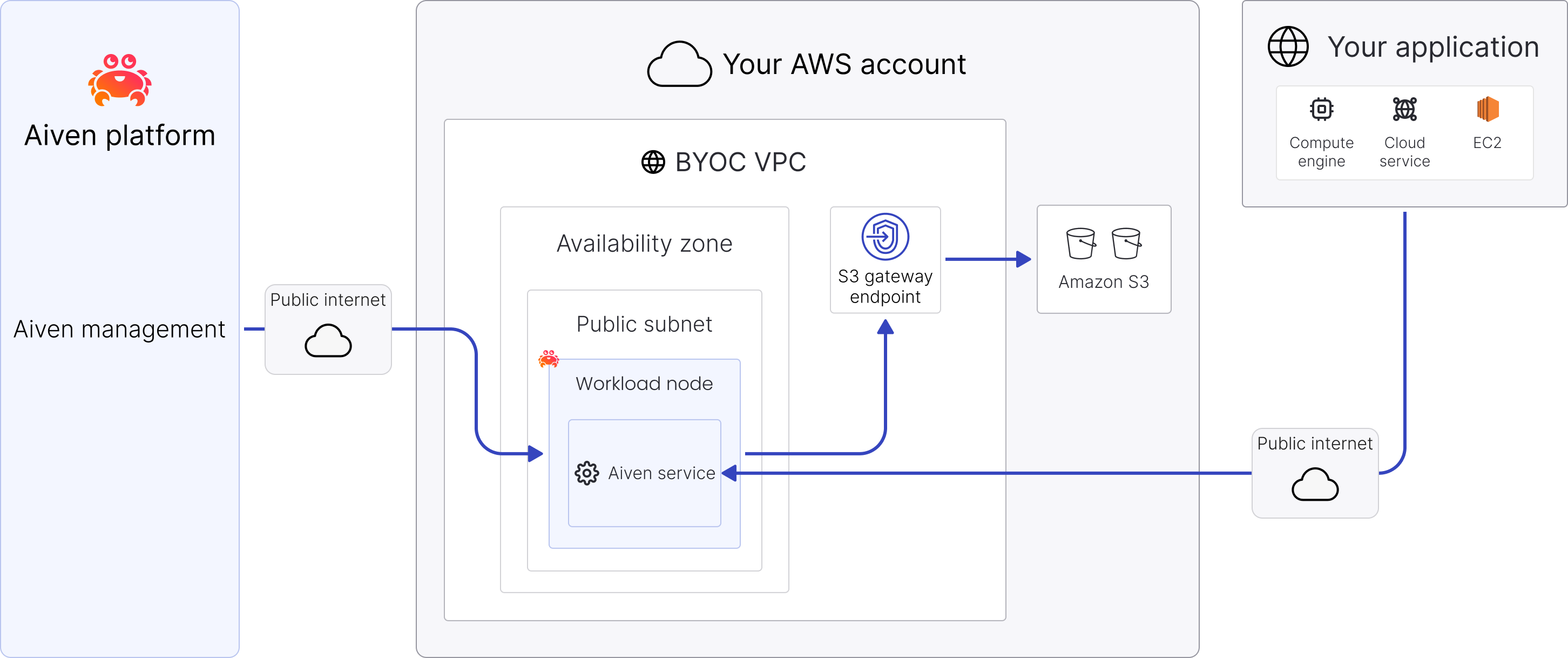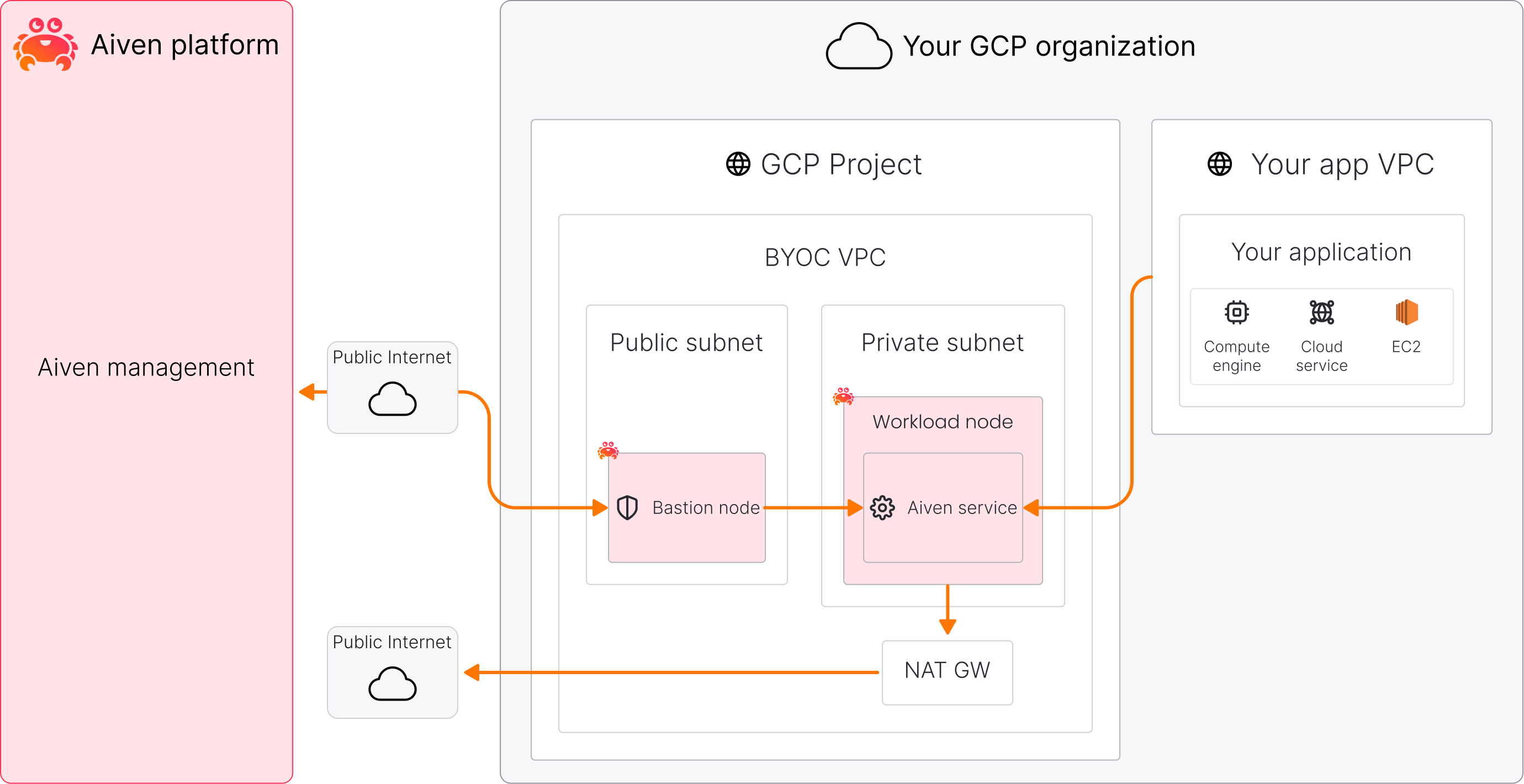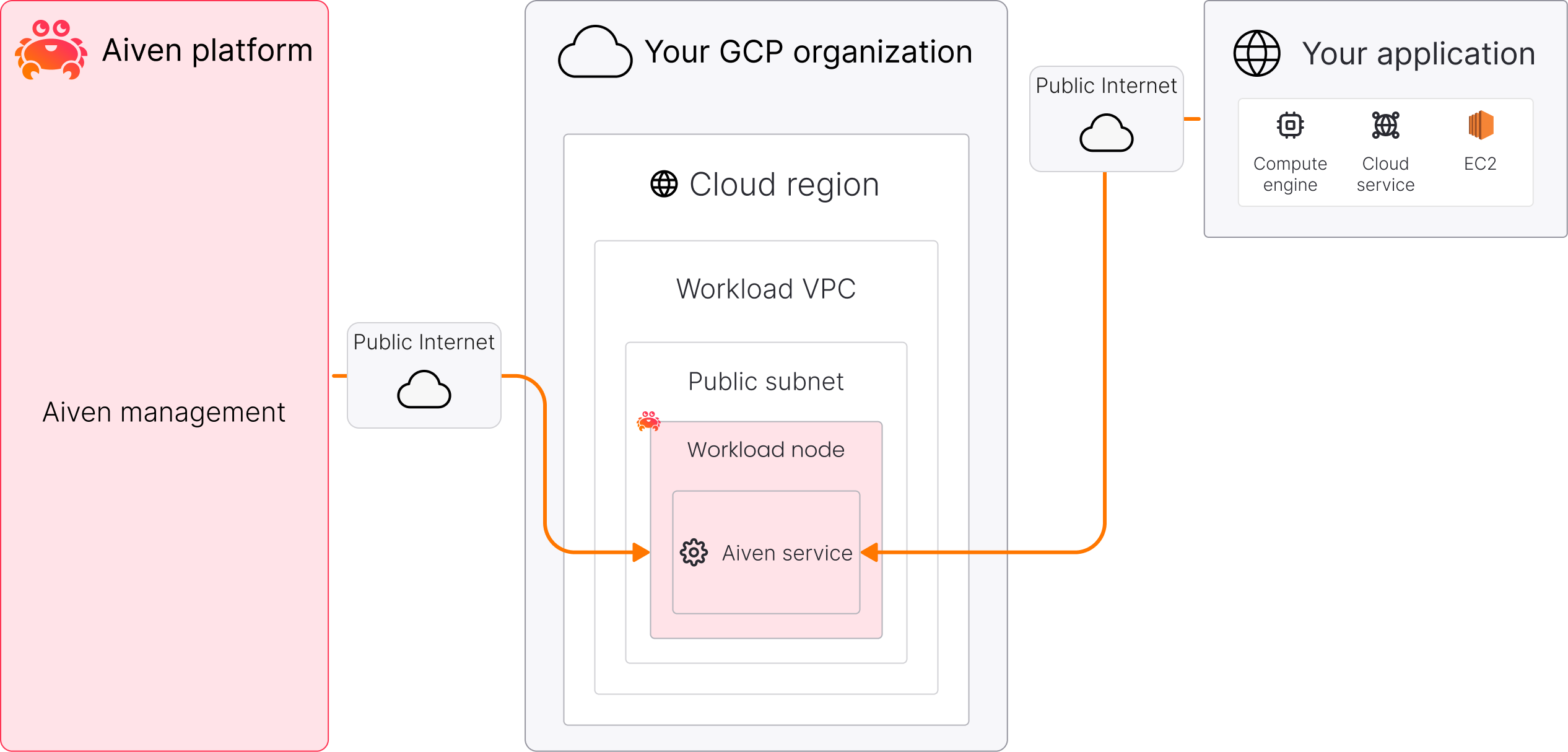Bring your own cloud (BYOC)
Bring your own cloud (BYOC) allows you to use your own cloud infrastructure instead of relying on the Aiven-managed infrastructure.
Aiven services are usually deployed on Aiven-managed infrastructure, using Aiven-managed security protocols, and backed by Aiven-managed storage and backups. This provides a straightforward and safe approach to deploying Aiven services. However, you might need a different configuration if your business, project, or organization has specific requirements. With BYOC, your Aiven organization gets connected with your cloud provider account by creating custom clouds in your Aiven organization.
How it works
A custom cloud is a secure environment within your cloud provider account to run Aiven-managed data services. By enabling BYOC, creating custom clouds, and setting up Aiven services within the custom clouds, you can manage your infrastructure on the Aiven platform while keeping your data in your own cloud.

- Enable BYOC in your Aiven organization by setting up a call with the Aiven sales team to share your use case and its requirements.
- Create a custom cloud in the Aiven Console or CLI by providing cloud setup details essential to generate your custom cloud infrastructure template.
- Integrate your cloud account with Aiven by applying the infrastructure template for AWS or Google Cloud.
- Deploy services by creating new Aiven-managed services in the custom cloud or migrating existing Aiven-managed services to the custom cloud.
- View Aiven-managed assets in your cloud account: You can preview Aiven-managed services and infrastructure in your cloud account.
Why use BYOC
Consider using BYOC and custom clouds if you have specific business needs or project requirements, such as:
- Compliance: Aiven offers managed environments for several standard compliance regulations, such as HIPAA, PCI DSS, and GDPR. However, if you have strict regulatory requirements or special compliance requirements, BYOC may be the best option for you.
- Network auditing: If you require the visibility of all traffic within any VPC you operate in or need frequent auditing capabilities, BYOC is potentially a good fit. BYOC gives you the ability to audit network metadata but not the actual contents.
- Fine-grained network control: BYOC only requires specific network access for Aiven (for example, service management or troubleshooting) to deploy and manage open source data services, otherwise allowing you to customize your network to meet any internal requirements or requirements of your customers.
- Cost optimization: Depending on your cloud provider, with BYOC you can use cost savings plans, committed use discounts, or other strategies to save on compute and storage infrastructure costs related to Aiven services.
Who is eligible for BYOC
The BYOC setup is a bespoke service offered on a case-by-case basis, and not all cloud providers support it yet. You're eligible for BYOC if:
-
You use Amazon Web Services (AWS) or Google Cloud.
-
You have a commitment deal with Aiven.
-
You have the Advanced or Premium support tier.
noteSee Aiven support tiers and Aiven responsibility matrix for BYOC. Contact your account team to learn more or upgrade your support tier.
When to use the regular Aiven deployment
BYOC deployments are not automated, and they add additional complexity to communicating to the Aiven control plane, service management, key management, and security.
In most cases, you can meet your regulatory and business requirements by utilizing a regular Aiven deployment or Enhanced Compliance Environment.
If you would like to understand BYOC better or are unsure which deployment model is the best fit for you, contact your account team.
BYOC pricing and billing
Unlike Aiven's standard all-inclusive pricing, the BYOC setup has custom pricing depending on the nature of your requirements. If you enter this arrangement, you are responsible for all cloud infrastructure and network traffic charges.
You receive two separate monthly invoices, one from Aiven for their managed services and another from the cloud service provider for the cloud infrastructure costs. This enables you to use any cloud commit you may have and potentially leverage enterprise discounts in certain cases.
For a cost estimate and analysis, contact your account team.
BYOC architecture
- AWS private
- AWS public
- Google Cloud private
- Google Cloud public

In the AWS private deployment model, a Virtual Private Cloud (BYOC VPC) for your Aiven services is created within a particular cloud region in your remote cloud account. Aiven accesses this VPC from a static IP address and routes traffic through a proxy for additional security. To accomplish this, Aiven utilizes a bastion host (Bastion node) logically separated from the Aiven services you deploy. The service VMs reside in a privately addressed subnet (Private subnet) and are accessed by the Aiven management plane via the bastion. They are not accessible through the internet.
Although the bastion host and the service nodes reside in the VPC under your management (BYOC VPC), they are not accessible (for example, via SSH) to anyone outside Aiven.
The bastion and workload nodes require outbound access to the internet to work properly (supporting HA signaling to the Aiven management node and RPM download from Aiven repositories).
Limited availability Object storage in your AWS cloud account is where your service's backups and cold data are stored using two S3 buckets.

In the AWS public deployment model, a Virtual Private Cloud (BYOC VPC) for your Aiven services is created within a particular cloud region in your remote cloud account. Aiven accesses this VPC through an internet gateway. Service VMs reside in a publicly addressed subnet (Public subnet), and Aiven services can be accessed through the public internet: the Aiven control plane connects to the nodes using the public address, and the Aiven management plane can access the service VMs directly. To restrict access to your service, you can use the IP filter.
Limited availability Object storage in your AWS cloud account is where your service's backups and cold data are stored using two S3 buckets.

In the Google Cloud private deployment model, a Virtual Private Cloud (BYOC VPC) for your Aiven services is created within a particular cloud region in your remote cloud account. Within the BYOC VPC, there are:
- Public subnet for the bastion node
- Private subnet for the workload nodes (your Aiven services)
Aiven accesses the BYOC VPC from a static IP address and routes traffic through a proxy for additional security. To accomplish this, Aiven utilizes a bastion host (Bastion note) logically separated from the Aiven services you deploy. The service VMs reside in a privately addressed subnet (Private subnet) and are accessed by the Aiven management plane via the bastion. They are not accessible through the internet.
Although the bastion host and the service nodes reside in the VPC under your management (BYOC VPC), they are not accessible (for example, via SSH) to anyone outside Aiven.
The bastion and workload nodes require outbound access to the internet to work properly (supporting HA signaling to the Aiven management node and RPM download from Aiven repositories).

In the Google Cloud public deployment model, a Virtual Private Cloud (Workload VPC) for your Aiven services is created within a particular cloud region in your remote cloud account. Aiven accesses this VPC through an internet gateway. Service VMs reside in a publicly addressed subnet (Public subnet), and Aiven services can be accessed through the public internet: the Aiven control plane connects to the nodes using the public address, and the Aiven management plane can access the service VMs directly. To restrict access to your service, you can use the IP filter.
Firewall rules are enforced on the subnet level. You can integrate your services using standard VPC peering techniques. All Aiven communication is encrypted.
BYOC service backups
Depending on the BYOC service, Aiven takes regular service backups to enable forking, point in time recovery (PITR), and disaster recovery.
Limited availabilityIf you enable tiered storage, AWS BYOC service backups are stored in Amazon S3 buckets within your AWS account.
- All backups are encrypted using Aiven-managed keys.
- You are responsible for managing object storage configuration.
Dev tools for BYOC
With BYOC, you can use any standard Aiven method (for example,
avn CLI client or Aiven Terraform Provider)
to manage your services and generally have the same user experience as with the regular
Aiven deployment model.
Related pages